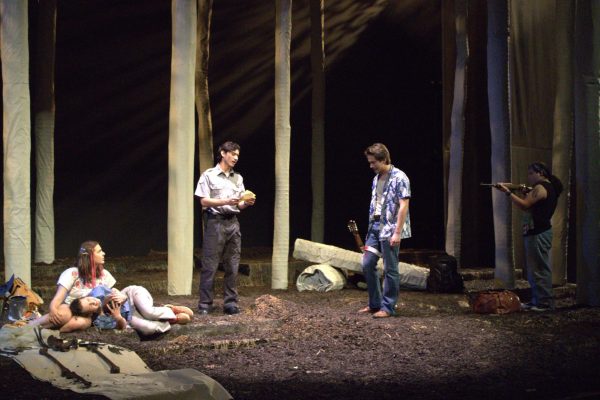Citizens brings together hope and honesty in Christian music
Christian band that originated in mega-church brings positivity to everyday doubts and fears
The Church (referring to all denominations/Christian churches and the people therein) in the United States has long dealt with what is called “prosperity theology.” Simply put, the prosperity gospel directly links belief in God and the presence of God with material wealth, physical health, and a pain-free life. And yet millions of people run into the limits of prosperity theology when believing in the Trinitarian God of the Old and New Testaments does not cure their physical and/or mental illness, save their loved ones from untimely or painful deaths, or provide a safe home to live in. There has to be a language for the liminal space we inhabit where Jesus’s death and resurrection has redeemed all of creation but all is not well. We have been given such a gift in the practice and posture of lament. Within the biblical practice of lament, honesty about the struggles and suffering we live in and through are necessary, but they are not the end of the story. Learning this language is vital, and the band Citizens (formerly known as Citizens & Saints) has walked beside me as I learn how to lament.
Citizens grew out of Mars Hill Church, a megachurch based in Seattle, Washington. The leadership scandals and issues that embroiled Mars Hill Church eventually led to its closing in January 2015. The lead singer of Citizens, Zach Bolen, had already resigned from his leadership position in the church when it became clear Mars Hill could not continue operating. Only the first two releases are tied to Mars Hill Church, their first EP “Already/Not Yet” and their eponymous debut LP. Even though Citizens embraced the tension we live in from the start (the title “Already/Not Yet” refers to what Jesus has already accomplished and what has not yet happened, namely the complete restoration of all creation), praising in the midst of pain has to be experienced first-hand. Their experience with Mars Hill Church has forced them to dwell in this already and not yet, which gives them the indispensable ability to join in the universal language of lament. The band’s sound stays consistent throughout their catalog, usually somewhere between rock and alternative—perhaps another nod to how there actually is space between the dichotomies we construct— yet their lyrical growth continually astounds me.
Their 2016 album “A Mirror Dimly” really caught my attention through songs like “Madness,” “Relent” and “Doubting Doubts.” The title comes from the Apostle Paul’s first letter to the Corinthians where he says, “For now we see in a mirror dimly, but then face to face. Now I know in part; then I shall know fully, even as I have been fully known” (1 Corinthians 13:12). This reminds me that I was not made to know everything, to have all the answers. It is especially easy to forget this truth in high-pressure environments like Trinity, where if you do not have all the answers, you’re doing something wrong. The song “Faith” almost redefines what it means to trust, pushing back against the postmodern idea that we can only trust what we know for certain. Intrinsic to faith is “putting confidence in things unseen.”
But this album is not secure in the strength of our own faith; it is secure in the strength of God’s faithfulness. The closing track “Doubting Doubts” was the first time I began to see doubts and questions as a normal part of life instead of something to be ashamed of and hide. The song rests on the idea that God’s love for us is not dependent on us at all. This is why honesty is vital to encouragement and to the community. When we all build sparkly, shining facades and refuse to admit our weaknesses, we cultivate a culture of shame and a cycle of comparison where no one is ever good enough because someone else always seems to have it all together.
The band’s 2019 album, “Fear,” seems aptly titled in hindsight. I was a high school senior when “Fear” was released, and I was more than a little afraid of what my college years would look like. But before I arrived at college, I had to decide where to go. That decision was largely paralyzing, but songs like “Everything for Nothing” and “Past” shifted and reshifted my focus towards God’s glory above all else. And what is the Christian life if not our wrong ideas about God being gently corrected through the faithfulness and persistence of Jesus’ heart for us? “Fear” as an album has followed me around ever since its release. “The Wait’s Not Easy” points to Jesus’s promise that though life will not be easy or pain-free, He has ultimately triumphed over death through his death and resurrection (John 16:33). I think their song “Illusion” exists in a similar vein by recognizing that a life without grief and sorrow is unattainable, no matter how hard you try. Their awareness of the pain that comes with inhabiting a broken world as broken people is one thing I love about Citizens. The thing I love even more is their hope that “Heaven is in Our Sights,” to borrow a song title from their 2020 album, “The Joy of Being.”
Learning to lament has been an uncomfortable process, but an essential one especially over the past two years where we experienced tremendous hurt as humanity and on a more personal level as I daily struggle with depression. Admitting that this is not how the world is supposed to be certainly does not cure anything, but it does create space for hope. There is no hope in prosperity theology; everything rests on me and you. We have to be positive enough, have enough money, and do enough of the “right” things to have a life that is free of grief. Citizens’ music, on the other hand, tells a better and truer story: Though we are broken, we are more beloved than we know.

My name is Ayden Smith and I am a junior studying English here at Trinity. I am from Friendswood, Texas, and grew up coming to San Antonio for little vacations....





